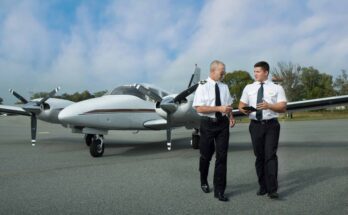Introduction Guide to Global Aviation Universities in 2025
The aviation industry is a vast and intricate ecosystem, encompassing everything from designing cutting-edge aircraft to managing sprawling international airports, and of course, piloting planes across continents.
For individuals with a passion for flight, innovation, or the complex logistics of air travel, a specialized education from a reputable aviation university is often the launchpad for a successful career.
Choosing the right institution can be a daunting task, given the multitude of programs, specializations, and global options available. This guide aims to demystify the landscape of global aviation universities, providing aspiring students with a clear roadmap to selecting the best educational path for their dreams. We will explore various types of aviation programs, highlight leading institutions worldwide, discuss crucial factors for selection, and offer insights into the exciting career opportunities that await graduates.
Decoding Aviation Education: Diverse Pathways to Success
Aviation education is not a monolithic entity. It branches into several distinct disciplines, each catering to different facets of the industry. Understanding these distinctions is the first step in identifying the right university for your ambitions.
H2: Pilot Training Programs: From Aspirant to Aviator
For many, the allure of aviation lies in the cockpit. Pilot training programs are designed to equip students with the practical skills and theoretical knowledge required to safely and efficiently operate aircraft. These programs vary significantly in structure and scope.
H3: Integrated Flight Training Academies
These academies offer comprehensive, accelerated programs that take students from zero flight experience to a Commercial Pilot License (CPL) and often an Airline Transport Pilot License (ATPL) frozen, preparing them for airline careers. They are known for their structured approach and strong industry connections.
- Key Institutions:
- Embry-Riddle Aeronautical University (USA): Often considered the “Harvard of Aviation,” ERAU is a global leader with campuses in Daytona Beach, Florida, and Prescott, Arizona, offering extensive flight training facilities and partnerships.
- CAE Oxford Aviation Academy (UK, Global): With a long-standing reputation, CAE operates numerous flight schools worldwide, known for their rigorous pilot training programs.
- University of North Dakota (USA): Its John D. Odegard School of Aerospace Sciences is highly regarded for its comprehensive flight training and research facilities.
- Western Michigan University (USA): Offers a highly respected collegiate aviation program with state-of-the-art facilities.
- Civil Aviation Flight University of China (China): A major institution for pilot training in Asia.
- Singapore Flying College (Singapore): Known for its high-quality training, often associated with Singapore Airlines.
- Indira Gandhi Rashtriya Uran Akademi (IGRUA) (India): A premier pilot training academy in India, owned and operated by the government.
Leading Institutions for Aviation Management
- Embry-Riddle Aeronautical University (USA): Also excels in aviation management, offering a wide range of degrees from bachelor’s to doctoral levels.
- Cranfield University (UK): Renowned for its postgraduate programs in air transport management and aviation safety.
- National School of Civil Aviation (ENAC) (France): A highly regarded European institution offering specialized master’s programs in aviation management.
- Purdue University (USA): Offers strong programs in aviation technology and management.
- University of North Dakota (USA): Known for its comprehensive aviation management offerings alongside flight training.
- The Hong Kong Polytechnic University (PolyU) (Hong Kong): Offers strong programs with a focus on Asian aviation markets.
- University of South Australia (Australia): Provides a Bachelor of Aviation Management focusing on airport and flight operations.
Aerospace Engineering and Technology: Designing the Future of Flight
For those fascinated by the mechanics and innovation behind aircraft and spacecraft, aerospace engineering and related technology degrees are the ideal choice. These programs delve into the design, development, testing, and maintenance of aerospace vehicles.
Specializations within Aerospace Engineering
- Aeronautical Engineering: Focuses on aircraft within the Earth’s atmosphere.
- Astronautical Engineering: Deals with spacecraft and rockets in outer space.
- Aircraft Maintenance Engineering (AME): Hands-on training for aircraft maintenance and repair, leading to certification.
Top Universities for Aerospace Engineering
- Massachusetts Institute of Technology (MIT) (USA): Consistently ranked among the top for aerospace engineering and research.
- California Institute of Technology (Caltech) (USA): Another elite institution known for its rigorous engineering programs.
- Georgia Institute of Technology (USA): Offers a highly respected aerospace engineering program.
- Stanford University (USA): Strong in various engineering disciplines, including aeronautical.
- University of Cambridge (UK): A globally recognized university with strong engineering departments.
- Imperial College London (UK): Known for its world-leading engineering and technology programs.
- Delft University of Technology (TU Delft) (Netherlands): A prominent European university for aerospace engineering.
- Purdue University (USA): Strong in both aviation technology and aerospace engineering.
- Indian Institutes of Technology (IITs) (India): IIT Bombay, IIT Madras, IIT Kharagpur are among the top for aerospace engineering in India.
- Beihang University (China): A leading institution in China for aeronautical and astronautical engineering.
Factors to Consider When Choosing an Aviation University
Selecting the right aviation university is a significant decision that impacts your career trajectory. Here are crucial factors to weigh:
Accreditation and Recognition
Ensure the program you choose is accredited by a recognized body. For example, in the US, the Aviation Accreditation Board International (AABI) accredits non-engineering aviation programs. Accreditation ensures the program meets specific quality standards and that your degree will be recognized by employers and regulatory bodies worldwide.
Faculty Expertise and Industry Connections
- Experienced Instructors: Are the faculty members active or former professionals in the aviation industry (e.g., airline pilots, air traffic controllers, airport managers, aerospace engineers)? Their real-world experience is a huge asset.
- Industry Partnerships: Does the university have strong ties with airlines, airports, MRO (Maintenance, Repair, and Overhaul) organizations, or aerospace companies? These connections can lead to internships, mentorships, and job opportunities.
Location and Global Exposure
- Geographic Focus: Some universities might have a stronger regional focus (e.g., European aviation regulations vs. FAA in the US). Consider where you intend to work after graduation.
- International Student Support: If you’re an international student, evaluate support services for visas, accommodation, and cultural integration.
- Networking Opportunities: Universities in major aviation hubs often provide more opportunities for networking with industry professionals.
Cost and Financial Aid
Aviation education can be expensive, especially pilot training. Research tuition fees, living expenses, and available scholarships, grants, and loan options. Some airlines or government bodies offer sponsorships for pilot training.
Student Life and Campus Culture
While academics are paramount, a supportive and engaging campus environment contributes significantly to your overall learning experience. Consider student organizations, extracurricular activities, and residential options.
Conclusion: Ready for Takeoff in Your Aviation Career
The global aviation industry is a realm of endless possibilities, constantly innovating and expanding. A strong educational foundation from a reputable aviation university is your most valuable asset in navigating this exciting landscape. By carefully researching your options, considering the factors outlined in this guide, and aligning your choice with your personal and professional aspirations, you can make an informed decision that sets you on a trajectory for a fulfilling and high-flying career. Whether you dream of soaring through the skies, strategizing from the control tower, or designing the next generation of aerospace marvels, the right global aviation university will provide you with the knowledge, skills, and connections to turn your aspirations into reality. The sky truly is the limit!

